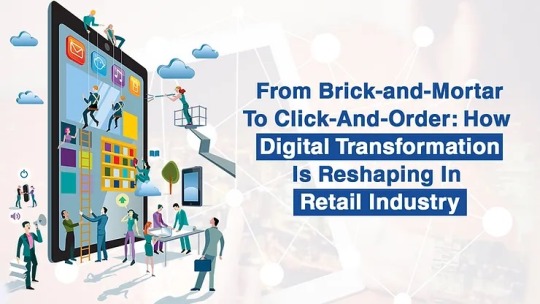#Digital transformation in retail
Text
Analyzing the Shift in Consumer Preferences Post-Pandemic
The pandemic has irrevocably altered the landscape of consumer preferences, presenting both challenges and opportunities for business owners. As the world navigates the aftermath, a significant shift towards online shopping, sustainability, and health-conscious choices has emerged. This evolution in consumer behavior underscores the importance for businesses to adapt and realign their offerings to meet these new demands. Understanding and integrating these preferences into business models will be key in capturing and retaining customer interest in a post-pandemic world.
Digital transformation has accelerated, making e-commerce not just an option but a necessity for retailers. The convenience, safety, and efficiency of online shopping have elevated consumer expectations, pushing businesses to enhance their digital platforms and logistics. Moreover, the rise of social media marketing has changed how brands connect with their audience, emphasizing the need for authentic and engaging online content. For businesses, investing in a robust online presence and e-commerce capabilities is crucial to tap into this shift and drive growth.
Sustainability has come to the forefront of consumer concerns, with a growing demand for eco-friendly products and practices. This shift reflects a deeper awareness of environmental issues and a desire to contribute positively by making responsible purchasing decisions. For business owners, this means prioritizing sustainability not just in products but in operations and messaging. Demonstrating a genuine commitment to environmental stewardship can strengthen brand reputation and loyalty among eco-conscious consumers.
Health and wellness have also gained prominence, influencing a wide range of industries from food and beverage to fitness and leisure. The pandemic heightened awareness around health, leading consumers to seek products and services that support their wellbeing. Businesses have the opportunity to cater to this trend by offering healthier options, transparent product information, and wellness-focused experiences. Aligning with these health-conscious preferences can differentiate a brand and attract a dedicated customer base.
In conclusion, the post-pandemic world presents a new paradigm of consumer preferences that business owners must navigate. Adapting to these changes, from digital adoption and sustainability to health and wellness, is not just beneficial but essential for businesses aiming to thrive. By understanding and responding to these shifts, companies can build a resilient and relevant brand that resonates with today’s consumers.
This article delves into the significant shifts in consumer preferences post-pandemic and outlines the crucial adjustments business owners need to make in response. Highlighting digital transformation, sustainability, and health consciousness as key trends, it provides a roadmap for businesses to adapt and succeed in the evolving market landscape. Through a persuasive and clear narrative, it encourages business owners to embrace these changes, leveraging them as opportunities to enhance their offerings and connect with consumers on a deeper level.
#post-pandemic consumer trends#shift in buying habits#digital transformation in retail#online shopping surge#health and safety priorities in businesses
0 notes
Text
Explore the impact of digital transformation in the retail industry. Learn how technology helps to enhanced CX, decision making, operational efficiency & more.
0 notes
Text

Do you run your business in the digital or stone age? If you are not leveraging the latest technologies to automate your retail business operations and retain your customers, you are missing out on a lot of opportunities. Your competitors make customers feel more special and engaged by offering personalized shopping.
It’s not only about products. If you can predict future market trends, you can also attract more customers. That’s what makes Digital transformation in retail so important!
Get the inside scoop on how to use the latest technology to transform your retail business.
0 notes
Text
From Brick-and-Mortar to Click-and-Order: How Digital Transformation is Reshaping Retail Industry

Discover the transformative journey from traditional retail to digital prowess. Explore the profound impact of digital transformation on the retail industry, uncovering enhanced customer experiences, increased efficiency, and broader market reach.
#Retail Tech#Digital Transformation#E-commerce Revolution#Retail Technology Trends#Digital transformation in retail
0 notes
Text
https://newsmantraa.us/digital-transformation-in-retail-market-is-booming-worldwide-ibm-microsoft-amazon-web-services/
0 notes
Text
Learn how digital transformation is revolutionizing the retail industry. Explore the latest trends, benefits, challenges, technologies, key considerations & use cases.
0 notes
Text
#technology#customerexperience#cx#customer experience#digital transformation#successivedigital#artificial intelligence#virtual reality#augmented reality#retail industry#blog#software development#mobile app development
0 notes
Text
Reimagine Retail: The Digital Transformation Revolution

Elevate your retail game with AquSag Technologies. Our experts help you harness the power of digital transformation to deliver exceptional customer experiences. From omnichannel strategies to personalized marketing and innovative AR/VR, we provide the solutions you need to thrive in today's competitive landscape.
#retail digital transformation#customer experience#omnichannel#personalization#AR/VR#e-commerce#retail technology#digital strategy.
0 notes
Text
Boost E-commerce in Saudi Arabia with ML-Powered Apps

In today's digital era, the e-commerce industry in Saudi Arabia is rapidly expanding, fueled by increasing internet penetration and a tech-savvy population. To stay competitive, businesses are turning to advanced technologies, particularly Machine Learning (ML), to enhance user experiences, optimize operations, and drive growth. This article explores how ML is transforming the e-commerce landscape in Saudi Arabia and how businesses can leverage this technology to boost their success.
The Current E-commerce Landscape in Saudi Arabia
The e-commerce market in Saudi Arabia has seen exponential growth over the past few years. With a young population, widespread smartphone usage, and supportive government policies, the Kingdom is poised to become a leading e-commerce hub in the Middle East. Key players like Noon, Souq, and Jarir have set the stage, but the market is ripe for innovation, especially with the integration of Machine Learning.
The Role of Machine Learning in E-commerce
Machine Learning, a subset of Artificial Intelligence (AI), involves the use of algorithms to analyze data, learn from it, and make informed decisions. In e-commerce, ML enhances various aspects, from personalization to fraud detection. Machine Learning’s ability to analyze large datasets and identify trends is crucial for businesses aiming to stay ahead in a competitive market.
Personalized Shopping Experiences
Personalization is crucial in today’s e-commerce environment. ML algorithms analyze user data, such as browsing history and purchase behavior, to recommend products that align with individual preferences. This not only elevates the customer experience but also drives higher conversion rates. For example, platforms that leverage ML for personalization have seen significant boosts in sales, as users are more likely to purchase items that resonate with their interests.
Optimizing Inventory Management
Effective inventory management is critical for e-commerce success. ML-driven predictive analytics can forecast demand with high accuracy, helping businesses maintain optimal inventory levels. This minimizes the chances of overstocking or running out of products, ensuring timely availability for customers. E-commerce giants like Amazon have successfully implemented ML to streamline their inventory management processes, setting a benchmark for others to follow.
Dynamic Pricing Strategies
Price is a major factor influencing consumer decisions. Machine Learning enables real-time dynamic pricing by assessing market trends, competitor rates, and customer demand. This allows businesses to adjust their prices to maximize revenue while remaining competitive. Dynamic pricing, powered by ML, has proven effective in attracting price-sensitive customers and increasing overall profitability.
Enhanced Customer Support
Customer support is another area where ML shines. AI-powered chatbots and virtual assistants can handle a large volume of customer inquiries, providing instant responses and resolving issues efficiently. This not only improves customer satisfaction but also reduces the operational costs associated with maintaining a large support team. E-commerce businesses in Saudi Arabia can greatly benefit from incorporating ML into their customer service strategies.
Fraud Detection and Security
With the rise of online transactions, ensuring the security of customer data and payments is paramount. ML algorithms can detect fraudulent activities by analyzing transaction patterns and identifying anomalies. By implementing ML-driven security measures, e-commerce businesses can protect their customers and build trust, which is essential for long-term success.
Improving Marketing Campaigns
Effective marketing is key to driving e-commerce success. ML can analyze customer data to create targeted marketing campaigns that resonate with specific audiences. It enhances the impact of marketing efforts, leading to improved customer engagement and higher conversion rates. Successful e-commerce platforms use ML to fine-tune their marketing strategies, ensuring that their messages reach the right people at the right time.
Case Study: Successful E-commerce Companies in Saudi Arabia Using ML
Several e-commerce companies in Saudi Arabia have already begun leveraging ML to drive growth. For example, Noon uses ML to personalize the shopping experience and optimize its supply chain, leading to increased customer satisfaction and operational efficiency. These companies serve as examples of how ML can be a game-changer in the competitive e-commerce market.
Challenges of Implementing Machine Learning in E-commerce
While the benefits of ML are clear, implementing this technology in e-commerce is not without challenges. Technical hurdles, such as integrating ML with existing systems, can be daunting. Additionally, there are concerns about data privacy, particularly in handling sensitive customer information. Businesses must address these challenges to fully harness the power of ML.
Future Trends in Machine Learning and E-commerce
As ML continues to evolve, new trends are emerging that will shape the future of e-commerce. For instance, the integration of ML with augmented reality (AR) offers exciting possibilities, such as virtual try-ons for products. Businesses that stay ahead of these trends will be well-positioned to lead the market in the coming years.
Influence of Machine Learning on Consumer Behavior in Saudi Arabia
ML is already influencing consumer behavior in Saudi Arabia, with personalized experiences leading to increased customer loyalty. As more businesses adopt ML, consumers can expect even more tailored shopping experiences, further enhancing their satisfaction and engagement.
Government Support and Regulations
The Saudi government is proactively encouraging the integration of cutting-edge technologies, including ML, within the e-commerce industry. Through initiatives like Vision 2030, the government aims to transform the Kingdom into a global tech hub. However, businesses must also navigate regulations related to data privacy and AI to ensure compliance.
Conclusion
Machine Learning is revolutionizing e-commerce in Saudi Arabia, offering businesses new ways to enhance user experiences, optimize operations, and drive growth. By embracing ML, e-commerce companies can not only stay competitive but also set new standards in the industry. The future of e-commerce in Saudi Arabia is bright, and Machine Learning will undoubtedly play a pivotal role in shaping its success.
FAQs
How does Machine Learning contribute to the e-commerce sector?
Machine Learning enhances e-commerce by improving personalization, optimizing inventory, enabling dynamic pricing, and enhancing security.
How can Machine Learning improve customer experiences in e-commerce?
ML analyzes user data to provide personalized recommendations, faster customer support, and tailored marketing campaigns, improving overall satisfaction.
What are the challenges of integrating ML in e-commerce? Challenges include technical integration, data privacy concerns, and the need for skilled professionals to manage ML systems effectively.
Which Saudi e-commerce companies are successfully using ML? Companies like Noon and Souq are leveraging ML for personalized shopping experiences, inventory management, and customer support.
What is the future of e-commerce with ML in Saudi Arabia?
The future looks promising with trends like ML-driven AR experiences and more personalized
#machine learning e-commerce#Saudi Arabia tech#ML-powered apps#e-commerce growth#AI in retail#customer experience Saudi Arabia#digital transformation Saudi#ML app benefits#AI-driven marketing#predictive analytics retail#Saudi digital economy#e-commerce innovation#smart retail solutions#AI tech adoption#machine learning in business
1 note
·
View note
Text
Celebrating National Mail Order Catalog Day: A Journey Through Shopping History
Celebrate National Mail Order Catalog Day on August 18 by exploring the history and impact of catalogs. Discover how these iconic shopping tools transformed retail and continue to inspire today.
Introduction
National Mail Order Catalog Day, celebrated on August 18, is a tribute to the iconic catalogs that revolutionized shopping and shaped consumer culture. From their humble beginnings as a means of reaching customers far and wide, mail order catalogs have evolved into a beloved shopping tradition that connects people with products in a unique and nostalgic way. This day is an…
#consumer culture#digital transformation#mail order catalogs#National Mail Order Catalog Day#Nostalgia#retail history#retail innovation#shopping history#shopping trends#vintage catalogs
0 notes
Text
10 Best Hyperlocal Marketplace Software for Brands in 2024

A hyperlocal marketplace software enables the seller to service their products in a specific geographical area, like a community or a neighbourhood. It meets the increasing demand for quick and personalised service by connecting nearby buyers and sellers.
In today’s fast-paced digital age, consumers increasingly seek convenience and localised options. Hyperlocal marketplaces have emerged as a powerful platform for businesses to connect with their communities. By offering a curated selection of local products and services, these marketplaces create a win-win situation for both merchants and customers.
Selecting the ideal hyperlocal marketplace software is crucial for brands aiming to engage with local customers and increase sales in 2024. The top 10 platforms mentioned, including Sekel Tech, offer diverse features such as seamless integration, advanced analytics, vendor management, and real-time tracking. These tools help brands build personalised, efficient, and scalable marketplaces that address the growing need for hyperlocal services. Choosing the right software will improve customer satisfaction and foster sustainable business growth.
Transform your local market presence with Sekel Tech — contact us today to optimise your hyperlocal marketplace and drive unparalleled growth.
0 notes
Text
0 notes
Text
Sam's Club Rolls Out AI-Powered Exit Technology
“Goodbye long lines! Sam’s Club’s new AI-powered exit technology makes checkout a breeze.”ok
Sam’s Club, a leading American membership-only warehouse club, has introduced an innovative AI-powered exit technology at its warehouse locations. This cutting-edge solution aims to streamline the shopping experience, allowing customers to exit the store 23% faster.
How it Works
The AI-powered exit…

View On WordPress
#Innovation#checkout#customer experience#digital transformation#efficiency#exit technology#future of retail.#I#Machine Learning#retail#retail tech#Sam&039;s Club#shopping#smart shopping#technology
0 notes
Text
Offer Overload: Sorting Through Online Shopping Promotions for the Best Deals of Recent Times
The world of online purchasing offers a wide range of options for finding great deals in the current digital era. Every day, promotional offers that range from right-away discounts to rewards schemes show up in our social media feeds and email inboxes. While having so many options is great, it can be challenging to choose through the sea of promotions to find the best deals. So, how can you correctly manage the offer deluge and take advantage of online shopping promotions? Let's breakdown it:

Decide on Your Targets:
Before falling into the world of online purchasing, you should know what you're looking for. Are you looking for particular products, or are you willing to try other deals? Setting priorities can help you stay focused amidst the constant arrival of promotions.
Comparing Shopping:
Avoid paying for the first offer you see. Take the time to compare pricing on other websites and platforms. Use price comparison tools and browser extensions to verify you are receiving the greatest bargain possible.
Subscribe to Newsletters:
If it feels like it is already overflowing with sales emails, it can be useful to sign up for newsletters from your favorite stores. A lot of businesses provide subscribers with access to special offers and discounts, so you can take advantage of savings that others may not be able to.
Follow on social media:
Social media platforms are great for keeping in touch with loved ones as well as learning about the newest deals offered by your favorite companies. Businesses can be connected on social media sites like Twitter and Instagram, where they frequently share about quick deals and special discounts.
Make use of reward programs:
A lot of internet businesses offer reward schemes that give regular customers access to special discounts, free delivery, and other benefits. Utilize these offers to get the most out of your savings and improve your shopping experience.
Give Care to Time:
When it comes to online shopping promotions, timing is everything. Be alert for weekends such as Black Friday and Cyber Sunday, as well as limited-time offers and holiday discounts. Making your purchases during these periods can save you a lot of money.
Conclusion:
A smart approach is necessary for understanding online shopping offers in an age of unlimited offers. Through price comparison, explaining priorities, using reward programs, using social media and newsletters, and being timing-aware, you may sort through the stream of offers and find the best deals that have appeared recently. In order to make the most of your online shopping experience, keep these pointers in mind the next time you're attracted by an excellent offer. Congratulations on your online purchasing,Check our product www.clickere.in
#Augmented Reality#Digital Transformation#Ethical Shopping#Mobile Commerce#Retail Trends#Social Commerce#Sustainability#Technology Trends#Virtual Reality
0 notes
Text
Reliance Industries: Pioneering Innovation, Driving Growth, Shaping the Future
Reliance Industries Limited (RIL) stands as a beacon of industrial might and innovation, not just within the confines of India but on the global stage. Founded by Dhirubhai Ambani in the 1960s, it has metamorphosed from a modest textile manufacturer into a behemoth straddling various sectors, including petrochemicals, refining, oil and gas exploration, retail, telecommunications, and digital…
View On WordPress
#Call to Action#Challenges#Corporate Social Responsibility#Corporate sustainability in India#Digital transformation in Indian retail sector#Future Outlook#Global Market#Global market expansion strategies#Indian conglomerates#Indian Economy#Innovation#Mukesh Ambani&039;s leadership#Opportunities#Petrochemical industry innovations#Regulatory challenges in Indian business#Reliance Industries#Reliance Industries growth trajectory#Reliance&039;s impact on Indian digital revolution#Reliance&039;s role in India&039;s energy sector#Sustainability#Technology
1 note
·
View note
Text
Transforming Retail in the Digital Age: The Emergence of Immersive Shopping Experiences

Explore the future of retail in 'Transforming Retail in the Digital Age: The Emergence of Immersive Shopping Experiences.' This concise overview delves into the integration of virtual and augmented reality, reshaping the retail landscape. Discover how these immersive technologies redefine customer engagement, providing a dynamic blend of convenience and excitement, ushering in a new era of personalized and captivating shopping experiences.
0 notes